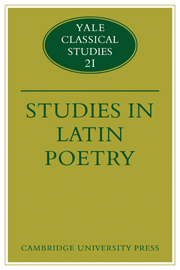Book contents
- Frontmatter
- Contents
- The Saturnian Verse
- The Menaechmi: Roman Comedy of Errors
- Imperator histricus
- Nine Epigrams from Pompeii (CIL 4.4966–73)
- Obscura de re lucida carmina: Science and Poetry in De Rerum Natura
- Catullus 64 and the Heroic Age
- Bacchus and the Horatian Recusatio
- Two Horatian Proems: Carm. 1.26 and 1.32
- Ovid and the Law
The Saturnian Verse
Published online by Cambridge University Press: 10 January 2011
- Frontmatter
- Contents
- The Saturnian Verse
- The Menaechmi: Roman Comedy of Errors
- Imperator histricus
- Nine Epigrams from Pompeii (CIL 4.4966–73)
- Obscura de re lucida carmina: Science and Poetry in De Rerum Natura
- Catullus 64 and the Heroic Age
- Bacchus and the Horatian Recusatio
- Two Horatian Proems: Carm. 1.26 and 1.32
- Ovid and the Law
Summary
The present essay does not seek to advance any new set of theories with regard to the Saturnian. Its purpose is rather to criticize some of those already current and to restate others in such a way as to make them more convincing to the skeptics. There is no dearth of correct observations in the scholarly literature devoted to the Saturnian, and there is even one general discussion, that of Leo, which seems to me to be right in many of its essential conclusions. What is most needed at present is some attempt to disengage valid observations from the fanciful contexts in which they are often embedded and, more important, some attempt to point the way, by example if possible, out of a methodological difficulty that has never been handled in a completely satisfactory fashion and is too often ignored altogether. The character of the difficulty is best stated in the words of A. W. De Groot, the scholar who has faced it most openly and coped with it most successfully:
La méthode usuelle d'investigation consiste à vérifier l'hypothèse, adoptée dès le début, que tel ou tel principe de versification est primaire … sans qu'on s'occupe sérieusement de la question de savoir si le principe reconnu comme primaire peut être secondaire, ou s'il peut y avoir deux principes primaires en même temps. Ainsi, par manque de contre-épreuve, on ne réussit ni à écarter tous les doutes sur ces points ni à déterminer le caractère et la mesure d'interdépendance de toutes les tendances observées.
- Type
- Chapter
- Information
- Studies in Latin Poetry , pp. 1 - 74Publisher: Cambridge University PressPrint publication year: 1969
- 1
- Cited by

